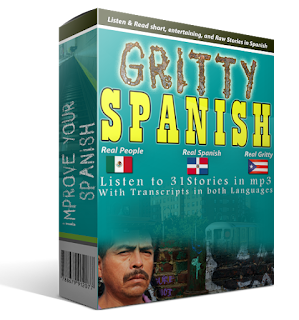Great links to learn Spanish for free
Great podcasts for beginners
Got some helpful links you'd like to share? Found a link that no longer works? Post a note in the comments and I'll update the list. In the mean time, enjoy! There's plenty of resources here to keep you busy and I have a lot more to add. Check back here periodically for updates or follow the Helping You Learn Spanish Facebook page to be notified when this list is updated. I also post a variety of things on the Facebook page that never make it to the blog so it's good idea to follow the page anyway.
STUFF TO LISTEN TO OR WATCH IN SPANISH
Radio Ambulante Latin America Storytelling Podcast
A collection of real life interviews and stories, all in Spanish. There's a lot of very interesting material here, all of it based on true events.
Lengalia – Spanish language and Culture podcasts
A collection of online podcasts to listen to about the Spanish language and culture of Spain and Latin America.
Mitele.es Spanish TV online [Video]
You'll find plenty of things to entertain you at this site. It's TV online so there's something for everybody.
PODCASTS FOR LEARNERS
Spanish Obsessed - Beginner, Intermediate and advanced audio podcasts
Run by Rob and Liz, they have a great website for people of all levels and focus on neutral and Colombian Spanish.
Lightspeed Spanish
Run by Rob and Liz, they have a great website for people of all levels and focus on neutral and Colombian Spanish.
Lightspeed Spanish
Focusing on the Spanish from Spain, this site is also run by a husband and wife team and has a lot of great content for learners at all levels.
LEARNING SPANISH IN SPANISH
Español Podcast
Narrated by an española named Mercedes, she has a vast collection of 30-60 minute podcasts where she teaches various grammar topics via a dialog and then goes on to explain everything you hear in the dialog in complete detail and has a transcript of the complete dialog, include her explanations. This is one of the best resources for learning Spanish on the internet.
Spanish 360 Podcast con Fabiana
Fabiana and her team teach you some of the finer points of Spanish and simplify some of the more complicated aspects of the Spanish language. This is one of my favorite sites.
Audiria Spanish Language Podcast
There's a huge collection to materials here for beginning to advanced learners. And if you're looking for the Spanish of Spain, this is the site for you.
SSL4YOU - Español Segunda Lengua para Todos
Destinos - An introduction to Spanish
This is one of the most well known and popular resources on the internet for learning Spanish. Below is the description of this course taken from Wikipedia.
Also known as simply Destinos, is a television program created by Bill Van Patten, who was, at the time, Professor of Spanish and Second Language Acquisition at the University of Illinois at Urbana Champaign. The show, designed to introduce viewers to the basics of Spanish, had two seasons, beginning in 1992. Its 52 episodes are often used for educational purposes in schools and are still broadcast regularly on many PBS stations, as well as many local channels.
PODCAST SHOWS
Mexican Slang Podcast
Learn Spanish with Diana and Héctor. They will explain some expressions and vocabulary words that are frequently used by Mexicans such as “¡qué padre!”, “híjole”, etc.
Desde el baño
A podcast created by an Argentina named Sofía, she literally recorded her podcasts in her bathroom. She talks about the language and culture of Argentina and it's a wonderful podcast. It's all in Spanish and she speaks a little fast, but if the Spanish of Argentina interests you it's worth the challenge if your Spanish abilities aren't quite there yet.
You can also find her podcasts on iTunes.
Dimelo caminando
This site doesn't have a ton of episodes but the content that's there is awesome. The podcasts are recorded in a mix of Spanish and English and focus primarily on Colombian Spanish. Each podcast is a combination of travel, language and culture. It's one of my favorites.
ADVANCED
Podcasts in Spanish
Escuche, aprenda y enseñe conversaciones españolas para principiantes elementales y preintermedios españoles
Edufone Learn Spanish Podcasts and Learn English Podcasts
Medical Spanish and Spanish Grammar Review
You won't find many websites, much less podcasts dedicated to medical Spanish, and this one is actually run by a doctor and goes into some serious details about all things medical.
News in Slow Spanish Podcast. Online Spanish grammar, expressions, pronunciation and grammar exercises
http://www.newsinslowspanish.com/home.php
IMPROVE YOUR LISTENING
University of Texas Spanish Proficiency Exercises
A huge collection of video interviews with accompanying dialogs and grammar lessons. This a great site to help you improve your listening abilities and overall knowledge of Spanish.
Spanish in Texas
Also by the University of Texas, very similar to the site listed above.
Language Media (Spanish Countries)
Another great collection of videos of Spanish speakers from various countries with accompanying transcripts in both English and Spanish.
Yabla Spanish
Another excellent website that has an enormous video library of interviews, TV shows, music videos and more to help you improve your listening skills. It isn't free, but at only $10/mo it's extremely affordable and well worth the money.
VeinteMundos – Your Spanish Language Magazine
This site has a vast library of free and extremely interesting articles for you to read, all in Spanish.
Spanish-English dialogues
A collection of short videos for beginners to more advanced students with transcripts in both English and Spanish.
Learn Spanish, Lingus.tv
Lingus TV teaches you Spanish through short humorous videos. Each video has a transcript, subtitles, translation and notes on the expressions and vocabulary you hear in the video. It's a great to learn and laugh at the same time.
Spanish Listening
This site has a wonderful collection of Spanish video interviews with people from different parts of the Spanish speaking world with complete transcripts and quizzes.









